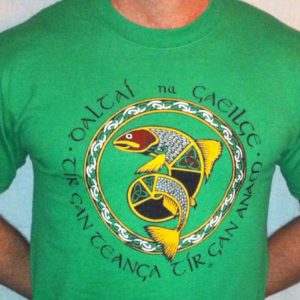Long horns are [always] on the cows abroad.
Note: It is no wonder that this proverb can be heard all across Ireland in one form or another. This variant is from Connacht. In Ulster, you might hear the more alliterative, “Bíonn adharca móra ar bha i bhad ó bhaile.” Whereas, in Munster, one is more likely to hear an older form, “”Bíonn adharca móra ar na buaibh tharr lear,” which retains a dative form not used commonly today. In that ancient agrarian society cows were a form of currency, a measure of one’s wealth. A poor tentant farmer with no cows would, therefore, find the lure of emmigration compelling.
However, this proverb uses the present habitual form of the verb to be, ‘bíonn,’ as an ironic warning that it may not be so. This syntax is used to convey the sense that something is usually the case. We took a little poetic liberty and inserted the word ‘always’ to emphasize this subtle meaning. It is the same meaning as the American proverb, “The grass is always greener in the other fellow’s yard.”
Note also: This seanfhocal is not necessarily a paean to Texas longhorns either. Both the Ulster and the Munster versions use the nominative plural form of the adjective ‘mór’ to describe the horns. It means big. Big horns mean big cows. ‘Long horns’ is just another metaphor for big cows. While the Irish did emmigrate to Texas, others emmigrated to Africa, especially South Africa, and still others to Australia. All these Irish emmigrants would have written home about long horned cattle.
